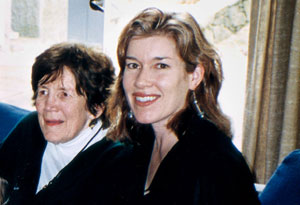
Photo: Courtesy of Zoe FitzGerald Carter
Should Zoe Fitzgerald Carter and her family stand by as their mother commits suicide?
A daughter's tale of the agonizing decision between life and death.
January
I don't have to answer the phone. On my knees in the bathroom, my daughters just settled into the tub, I have the perfect excuse to ignore it. Let the machine pick it up instead. But I head for the door, reminding Lane and Clara—who at 4 and 8 are hardly at risk for drowning—to keep the water in the tub and hold off on the shampoo.
Shading my eyes from the blinding late-day sun, I cross the bedroom, glancing out at the glimmering strip of the San Francisco Bay and, just beyond it, the hazy outline of the Golden Gate Bridge. Four years on the West Coast and this view of water and sky still thrills me.
I pick up the phone, annoyed with myself for answering it.
It's my mother.
"Oh, there you are! Have I caught you at a bad time?" Her voice sounds cheerful and a little excited, as if she has good news. "I was just looking at my calendar and wondering if you could come to D.C. the first weekend of February."
"I'm not sure. I'll have to check. What's up?" I drop onto the bed, heart beginning to clamor. I know what's up.
"Well gosh, honey, I've been trying to find a good time to end things as you know, and I was hoping that weekend might work for you. I haven't called your sisters yet, but of course I want them here, too. And your girls if you can bring them. I'm still working out the details, but—"
"Jesus, Momma," I hiss, cupping my hand over my mouth so Clara and Lane can't hear me. "You make it sound like a family reunion!"
"Well, there's no reason to get huffy, Zoe," she says. "I can't plan anything unless I know you girls are available. Can you just peek at your calendar?"
"No, I can't! I'm in the middle of giving my kids a bath, I don't have my calendar, and I can't think about this now."
"Fine." Her irritation is palpable and for a moment there is silence. "So when can you call me back?" _
I want to say never. I will never call her back if she insists on talking about killing herself. But I think of her lying alone in her big empty bed, of her dying alone because her daughters weren't willing to show up, and my petulance turns to shame.
"I'll call you tomorrow," I say.
"Okay, sweetie." Her voice is cheerful again. "That's great. Talk to you then!"
March
Despite my assurances that I'm perfectly happy to take a cab from Dulles airport, my mother insists on hiring a car to pick me up. The driver is a slim, good-looking man in a dark suit, so sleek and well groomed I'm immediately conscious of my wrinkled Gap capris and unbrushed hair.
Sliding into the back of his gleaming black Town Car, I collapse against the thickly cushioned leather seats and close my eyes.
"So, how's your mother?" the driver asks, turning to look at me. "We haven't heard from her for quite a while."
I sit up, blinking my eyes, which are blurred and sticky from my contact lenses. "Uh, about the same, I'd say. Just staying a little closer to home these days."
"Well, I'm real glad to hear she's all right," he continues, thoughtfully. "We were talking about her just before she rang yesterday, wondering if she was okay. We used to pick her up two, three times a month. Take her out to Baltimore to see her aunt. She's a special lady, your mom."
I'm touched that the driver—his name is Derrick—has called my mother "special," although I've been seeing her inspire this kind of interest and affection from strangers my whole life.
My mother has a doe-eyed, romantic quality that people find irresistible: Men want to protect her, women want to be her friend, and everyone agrees she's stylish and beautiful. With her dark eyes and hair, her prominent cheekbones and chin, she looks like Jackie Kennedy, only a taller, rangier version, not so coiffed and demurely feminine. Even now, with her spine buckled from osteoporosis, her face gaunt and shuttered from illness, she projects an appealing Victorian fragility.
What's funny is that this image of her couldn't be further from the truth. My mother's shy and vulnerable demeanor belies a stubborn, unsentimental nature. Although quick to admire people whose intellectual and artistic accomplishments she deems worthy, she can be casually brutal in her assessments of friends and strangers alike. My whole life I've heard her describe people as "terribly angry" or "not very bright," and she once remarked about her own goddaughter that she hadn't amounted to a hill of beans. Yet somehow this quality is never apparent to people outside our family. Even her closest friends seem to view her as a frail and exotic flower perpetually in need of their care.
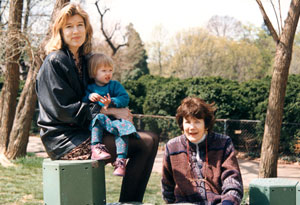
Photo: Courtesy of Zoe FitzGerald Carter
The conversation tapers off as we speed along, and I'm grateful for these last few moments of quiet. My oldest sister, Katherine, will be at my mother's house by now, and I'm nervous about seeing her. Relations between us have never been easy and they've become especially fraught since my father's death seven years ago. I can't help wishing it were my other sister, Hannah, meeting me here.
"I can't do it," Hannah said when I called to ask. "Dan has to travel to Toronto for a music festival, Fiona has a school play, and I'd have to take Evie with me, and frankly, flying with Evie is a nightmare." Hannah's 2-year-old was famous for throwing up on planes. "Besides, if Momma sticks to her current plan of killing herself on May 1, I'll be down there soon enough."
"But what about the Hemlock guy?"
"You mean death's little helper?"
I laughed. "Actually, I think they're called exit guides. But whatever he's called, Momma wants us there when he comes."
"I'm sorry, Zoe. You're going to have to deal with him by yourself."
My stomach lurches as the car swings onto Key Bridge and heads toward the glowing lights and cobblestone streets of Georgetown. A dread so familiar it's almost comforting fills me as we make the ascent up Wisconsin Avenue, past the soaring, lit facade of the Washington National Cathedral, and then onto Ordway Street.
I peer up at my mother's enormous gray stucco house, looming like a dilapidated ocean liner over the street below.
"You made it," my mother says in a small, happy voice as I walk into her bedroom. She reaches up and grabs my shoulders. Her grip is tight and surprisingly strong, although I can feel the deep tremors running through her arms.
Releasing me, she sinks back onto her pillow. She looks oddly childlike with the ruffle of her flannel nightgown framing her face. Her once dark and luxurious hair lies flat against her head and I notice that the gray has crept almost to her ears.
"How're you feeling?"
She wrinkles her nose. "Well, I was trying to make this darn list all day for that Hemlock fellow and now my arm and shoulder are killing me."
"What list?" I ask, instantly wary.
"They ask you for a summary of your medical conditions. So they can evaluate you."
"You mean decide if you're sick enough to die?"
I say it lightly but deliberately, wanting to hurt her. I realize I've been half-expecting her to chicken out, cancel the appointment, and am angry that she hasn't. I could be at home right now enjoying a quiet Friday night with my husband, Jack, and my children, instead of back in D.C., embroiled in my mother's suicide plans.
But she only laughs. "Yes, exactly. They don't want you killing yourself if you've only got a hangnail."
"I can't do it," Hannah said when I called to ask. "Dan has to travel to Toronto for a music festival, Fiona has a school play, and I'd have to take Evie with me, and frankly, flying with Evie is a nightmare." Hannah's 2-year-old was famous for throwing up on planes. "Besides, if Momma sticks to her current plan of killing herself on May 1, I'll be down there soon enough."
"But what about the Hemlock guy?"
"You mean death's little helper?"
I laughed. "Actually, I think they're called exit guides. But whatever he's called, Momma wants us there when he comes."
"I'm sorry, Zoe. You're going to have to deal with him by yourself."
My stomach lurches as the car swings onto Key Bridge and heads toward the glowing lights and cobblestone streets of Georgetown. A dread so familiar it's almost comforting fills me as we make the ascent up Wisconsin Avenue, past the soaring, lit facade of the Washington National Cathedral, and then onto Ordway Street.
I peer up at my mother's enormous gray stucco house, looming like a dilapidated ocean liner over the street below.
"You made it," my mother says in a small, happy voice as I walk into her bedroom. She reaches up and grabs my shoulders. Her grip is tight and surprisingly strong, although I can feel the deep tremors running through her arms.
Releasing me, she sinks back onto her pillow. She looks oddly childlike with the ruffle of her flannel nightgown framing her face. Her once dark and luxurious hair lies flat against her head and I notice that the gray has crept almost to her ears.
"How're you feeling?"
She wrinkles her nose. "Well, I was trying to make this darn list all day for that Hemlock fellow and now my arm and shoulder are killing me."
"What list?" I ask, instantly wary.
"They ask you for a summary of your medical conditions. So they can evaluate you."
"You mean decide if you're sick enough to die?"
I say it lightly but deliberately, wanting to hurt her. I realize I've been half-expecting her to chicken out, cancel the appointment, and am angry that she hasn't. I could be at home right now enjoying a quiet Friday night with my husband, Jack, and my children, instead of back in D.C., embroiled in my mother's suicide plans.
But she only laughs. "Yes, exactly. They don't want you killing yourself if you've only got a hangnail."

Photo: Courtesy of Zoe FitzGerald Carter
I smile, concede. I haven't seen my mother this chipper in a while. "Well, I hope you came up with a worthy document."
"My problems are actually pretty impressive, you know."
It's true. My mother has congestive heart failure, asthma, chronic pulmonary disease, osteoporosis, arthritis, and low blood pressure, which causes her to occasionally and unexpectedly pass out. But Parkinson's is still the biggie, and there's no question it's getting worse. Several times she experienced brain logjams that rendered her temporarily speechless and has recently begun experiencing bouts of dyskinesia in the form of uncontrolled writhing, indicating that her Parkinson's is advancing and it's harder for her meds to control it.
"I do know. It's amazing you're still around."
"Right. Well, of course, that's the problem."
It was last June when my mother and I had gone to see Dr. Harmon, a local psychiatrist and prominent member of the assisted-suicide movement; someone had suggested she consult with him to find out if she was a good candidate for "self-deliverance," as Hemlock Society founder Derek Humphry calls it. I agreed to go with her, although the idea of my mother committing suicide was pretty theoretical back then, kind of like our yearly disaster drills in Northern California meant to prepare us for the "Big One."
Driving to Dr. Harmon's office on a tree-lined street near Dupont Circle, I could see she was nervous. She hates public speaking and likes to prepare herself before meetings and even phone calls. I had more than once found cryptic comments like "ask why angry" with one of our initials next to them on her calendar.
"Don't worry, he's going to love you," I whispered as we walked up the path to Dr. Harmon's pretty, white-shingled house. "Just be your normal charming self."
"Thanks," she said, drily, clutching my arm. "If only it were that easy."
We were almost at the top of the stairs when a woman in somber, nondescript clothes and an old-fashioned bouffant hairdo came through the door. I pegged her as a retired government secretary or administrator. She hurried by without looking at us, leaving a palpable cloud of melancholy in her wake.
A tall, white-haired man appeared and waved us into a large, comfortable room. "So," he said, smiling at both of us. "Why don't you tell me why you're here?"
My mother's jeans-covered knees did a little dance at the edge of the sofa, where she perched, looking precarious and uncomfortable. It took several throat clearings before she said, "I wanted to talk to you about ending my life. Or at least having the option to end it."
"My problems are actually pretty impressive, you know."
It's true. My mother has congestive heart failure, asthma, chronic pulmonary disease, osteoporosis, arthritis, and low blood pressure, which causes her to occasionally and unexpectedly pass out. But Parkinson's is still the biggie, and there's no question it's getting worse. Several times she experienced brain logjams that rendered her temporarily speechless and has recently begun experiencing bouts of dyskinesia in the form of uncontrolled writhing, indicating that her Parkinson's is advancing and it's harder for her meds to control it.
"I do know. It's amazing you're still around."
"Right. Well, of course, that's the problem."
It was last June when my mother and I had gone to see Dr. Harmon, a local psychiatrist and prominent member of the assisted-suicide movement; someone had suggested she consult with him to find out if she was a good candidate for "self-deliverance," as Hemlock Society founder Derek Humphry calls it. I agreed to go with her, although the idea of my mother committing suicide was pretty theoretical back then, kind of like our yearly disaster drills in Northern California meant to prepare us for the "Big One."
Driving to Dr. Harmon's office on a tree-lined street near Dupont Circle, I could see she was nervous. She hates public speaking and likes to prepare herself before meetings and even phone calls. I had more than once found cryptic comments like "ask why angry" with one of our initials next to them on her calendar.
"Don't worry, he's going to love you," I whispered as we walked up the path to Dr. Harmon's pretty, white-shingled house. "Just be your normal charming self."
"Thanks," she said, drily, clutching my arm. "If only it were that easy."
We were almost at the top of the stairs when a woman in somber, nondescript clothes and an old-fashioned bouffant hairdo came through the door. I pegged her as a retired government secretary or administrator. She hurried by without looking at us, leaving a palpable cloud of melancholy in her wake.
A tall, white-haired man appeared and waved us into a large, comfortable room. "So," he said, smiling at both of us. "Why don't you tell me why you're here?"
My mother's jeans-covered knees did a little dance at the edge of the sofa, where she perched, looking precarious and uncomfortable. It took several throat clearings before she said, "I wanted to talk to you about ending my life. Or at least having the option to end it."
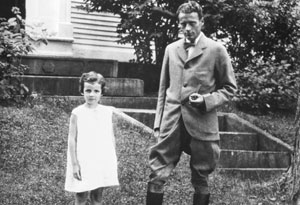
Photo: Courtesy of Zoe FitzGerald Carter
"I understand." He smiled. "Can you tell me why you might want that option?"
My mother glanced over at me and I nodded encouragingly. "I'm 75. I've had Parkinson's since my 50s, and as I'm sure you know, it's a degenerative disease. Things have gotten much harder for me in the last year—even walking is getting difficult. I've belonged to a Parkinson's support group for years. Several of the people in my group have died. Friends of mine. They were in very bad shape at the end. Completely helpless, really. I don't want to go through that."
"Let me ask you something," Dr. Harmon said, leaning forward. "Would you say you're depressed?"
"No." My mother gave a little toss of her head, as if to demonstrate her point. "I do feel lonely sometimes. My husband died a few years ago and my children live in other cities. But I have friends and I don't believe I'm depressed."
He turned to me. "How about you? Do you think your mother is depressed?"
I wanted to say, "Yes, of course she's depressed. Why else would she be talking to you about ending her life?" But I simply said, "No, I guess not. I would say my mother's unhappiness is pretty reasonable given her situation."
"Okay." Dr. Harmon placed both his hands on his knees with a brisk slap, as if getting ready to rise. "You've come to get a prescription for Seconal. Am I right?"
"Yes," my mother said, the word exploding out of her as if she'd been holding her breath. "That's exactly right."
"Good. I'll write it for you and you can get it filled today if you wish. Wait a couple of months and then get it refilled. Your third refill should be two months after that. We don't want to alarm the pharmacist. In the end, you'll have 60 pills, plenty to cause death. If you have any other questions, I'm happy to answer them."
My mother looked over at me, clearly pleased, but I felt a strong urge to argue with the charming doctor. "Um, well, I have a question," I said, avoiding my mother's gaze. "I'm not exactly clear how you make the decision to give—or not give—someone a prescription for Seconal."
"That's an excellent question," he said, sitting back in his chair and giving me his crinkly-eyed smile. "I don't give prescriptions to everyone, but your mother is dealing with a very serious disease that, as she knows, is going to worsen over time. And I don't believe she should have to live any longer or suffer any more than she herself wants to."
I nod at the doctor, still wary.
My mother glanced over at me and I nodded encouragingly. "I'm 75. I've had Parkinson's since my 50s, and as I'm sure you know, it's a degenerative disease. Things have gotten much harder for me in the last year—even walking is getting difficult. I've belonged to a Parkinson's support group for years. Several of the people in my group have died. Friends of mine. They were in very bad shape at the end. Completely helpless, really. I don't want to go through that."
"Let me ask you something," Dr. Harmon said, leaning forward. "Would you say you're depressed?"
"No." My mother gave a little toss of her head, as if to demonstrate her point. "I do feel lonely sometimes. My husband died a few years ago and my children live in other cities. But I have friends and I don't believe I'm depressed."
He turned to me. "How about you? Do you think your mother is depressed?"
I wanted to say, "Yes, of course she's depressed. Why else would she be talking to you about ending her life?" But I simply said, "No, I guess not. I would say my mother's unhappiness is pretty reasonable given her situation."
"Okay." Dr. Harmon placed both his hands on his knees with a brisk slap, as if getting ready to rise. "You've come to get a prescription for Seconal. Am I right?"
"Yes," my mother said, the word exploding out of her as if she'd been holding her breath. "That's exactly right."
"Good. I'll write it for you and you can get it filled today if you wish. Wait a couple of months and then get it refilled. Your third refill should be two months after that. We don't want to alarm the pharmacist. In the end, you'll have 60 pills, plenty to cause death. If you have any other questions, I'm happy to answer them."
My mother looked over at me, clearly pleased, but I felt a strong urge to argue with the charming doctor. "Um, well, I have a question," I said, avoiding my mother's gaze. "I'm not exactly clear how you make the decision to give—or not give—someone a prescription for Seconal."
"That's an excellent question," he said, sitting back in his chair and giving me his crinkly-eyed smile. "I don't give prescriptions to everyone, but your mother is dealing with a very serious disease that, as she knows, is going to worsen over time. And I don't believe she should have to live any longer or suffer any more than she herself wants to."
I nod at the doctor, still wary.
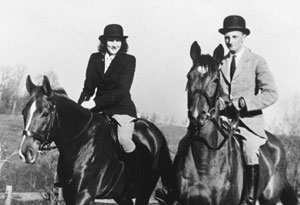
Photo: Courtesy of Zoe FitzGerald Carter
"She seems mentally competent and fit. If I had any question about this, I wouldn't give it to her. The woman you passed on your way in came for the same thing and I said no."
"Why did she want it?"
"She was recently diagnosed with a degenerative eye condition that will eventually lead to blindness. She was upset, but I didn't think it was the right time for her to make such an important decision."
"But you think it is the right time for my mother?" I persisted.
"Yes. I do."
July
By Tuesday night, my mother has become nearly invisible, having opted to starve herself. She hasn't eaten for 12 days. According to one of Dr. Harmon's pamphlets, cessation of food and drink was a "relatively quick and painless way to die" and less traumatic for the family than the sudden ingestion of drugs. The fact that she'd also attempted—and failed—to kill herself with an overdose of morphine four days earlier is all but forgotten. Death is finally under way.
Lying on the bed next to her, my arm around her waist, I sing to her, quietly but continually, one song after the next, convinced that she recognizes and is comforted by the sound of my voice.
"Shenandoah." "Red River Valley." "Shady Grove." My voice is soft and clear, the songs are exquisite and sad: the ones she sang to me when I was a child and, I imagine, were sung to her. Not by her parents, who were too glamorous and distracted to put their only child to bed—but by one of her beloved childhood nurses.
Most of the time I don't feel sad lying here, although sometimes the thought that I'm singing to my dying mother makes me tear up, as if I am watching myself in a movie.
I start the final chorus of "Wild Mountain Thyme." And we'll all go together / To pull wild mountain thyme / All around the purple heather.
Hannah leaves to call her husband, as I keep singing.
And then I stop.
Something feels different, something subtle, like a shift in temperature or a sudden absence of sound—sound you've been only vaguely aware of. I look around the room, trying to identify what's changed, but it looks the same. Everything is tidy and in its place. Her papers are put away. The visitors' chairs are pushed back against the bookshelf. The oxygen tank is unhooked and sitting in the corner. I look down at my mother, her profile etched darkly against the pillow. Is it her? Is she dead?
My eyes move down her body, find the gentle rise and fall of her ribs. Relieved, I lay my hand alongside her arm, feeling the hardness of bone, but sense no answering frequency, the "being there" that usually answers me when I touch her. That responding presence—her presence—is missing, like a background hum that's dropped away, or a breeze that's ceased to blow, leaving only still air behind.
"Good night," I tell my mother, kissing her head. "I love you."
Again, I have to look carefully to see that she's breathing.
Hannah has come back into the room. "Are you okay?" I ask.
She gives me a look that I cannot interpret. I wonder if she also feels this unsettling absence, but am too exhausted to ask.
"I'm fine. I want to stay. You go on."
"Wake me if—"
"I will."
"Why did she want it?"
"She was recently diagnosed with a degenerative eye condition that will eventually lead to blindness. She was upset, but I didn't think it was the right time for her to make such an important decision."
"But you think it is the right time for my mother?" I persisted.
"Yes. I do."
July
By Tuesday night, my mother has become nearly invisible, having opted to starve herself. She hasn't eaten for 12 days. According to one of Dr. Harmon's pamphlets, cessation of food and drink was a "relatively quick and painless way to die" and less traumatic for the family than the sudden ingestion of drugs. The fact that she'd also attempted—and failed—to kill herself with an overdose of morphine four days earlier is all but forgotten. Death is finally under way.
Lying on the bed next to her, my arm around her waist, I sing to her, quietly but continually, one song after the next, convinced that she recognizes and is comforted by the sound of my voice.
"Shenandoah." "Red River Valley." "Shady Grove." My voice is soft and clear, the songs are exquisite and sad: the ones she sang to me when I was a child and, I imagine, were sung to her. Not by her parents, who were too glamorous and distracted to put their only child to bed—but by one of her beloved childhood nurses.
Most of the time I don't feel sad lying here, although sometimes the thought that I'm singing to my dying mother makes me tear up, as if I am watching myself in a movie.
I start the final chorus of "Wild Mountain Thyme." And we'll all go together / To pull wild mountain thyme / All around the purple heather.
Hannah leaves to call her husband, as I keep singing.
And then I stop.
Something feels different, something subtle, like a shift in temperature or a sudden absence of sound—sound you've been only vaguely aware of. I look around the room, trying to identify what's changed, but it looks the same. Everything is tidy and in its place. Her papers are put away. The visitors' chairs are pushed back against the bookshelf. The oxygen tank is unhooked and sitting in the corner. I look down at my mother, her profile etched darkly against the pillow. Is it her? Is she dead?
My eyes move down her body, find the gentle rise and fall of her ribs. Relieved, I lay my hand alongside her arm, feeling the hardness of bone, but sense no answering frequency, the "being there" that usually answers me when I touch her. That responding presence—her presence—is missing, like a background hum that's dropped away, or a breeze that's ceased to blow, leaving only still air behind.
"Good night," I tell my mother, kissing her head. "I love you."
Again, I have to look carefully to see that she's breathing.
Hannah has come back into the room. "Are you okay?" I ask.
She gives me a look that I cannot interpret. I wonder if she also feels this unsettling absence, but am too exhausted to ask.
"I'm fine. I want to stay. You go on."
"Wake me if—"
"I will."
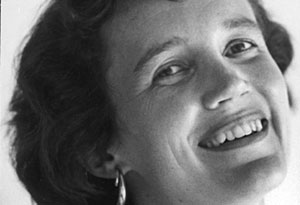
Photo: Courtesy of Zoe FitzGerald Carter
A few hours later, I bolt up from the bed before Hannah can speak or touch me; it's as if I were expecting her. For a moment, we stare silently at each other, and then, still without speaking, I grab my robe and follow her down the stairs. My mother lies on her back, her mouth and eyes both open.
"I'm not sure why I woke," Hannah says quietly, standing next to me, "but I noticed that her breathing had slowed. Her last few breaths were several minutes apart and then she…just stopped."
I nod, unable to speak. And then I go over to my mother, reach down, and gently lower her eyelids. They feel waxy and cool under my fingertips. I look down at her face. Good-bye, I call to her silently. In my head, my voice is warm and strong. Good-bye, good-bye, wherever you are.
Copyright © 2010 by Zoe FitzGerald Carter. From the forthcoming book Imperfect Endings, by Zoe FitzGerald Carter, to be published by Simon & Schuster in March. As in the book, all names were changed except for the writer's and public figures'.
"I'm not sure why I woke," Hannah says quietly, standing next to me, "but I noticed that her breathing had slowed. Her last few breaths were several minutes apart and then she…just stopped."
I nod, unable to speak. And then I go over to my mother, reach down, and gently lower her eyelids. They feel waxy and cool under my fingertips. I look down at her face. Good-bye, I call to her silently. In my head, my voice is warm and strong. Good-bye, good-bye, wherever you are.
Copyright © 2010 by Zoe FitzGerald Carter. From the forthcoming book Imperfect Endings, by Zoe FitzGerald Carter, to be published by Simon & Schuster in March. As in the book, all names were changed except for the writer's and public figures'.
The author with her mother at the family home in D.C.




